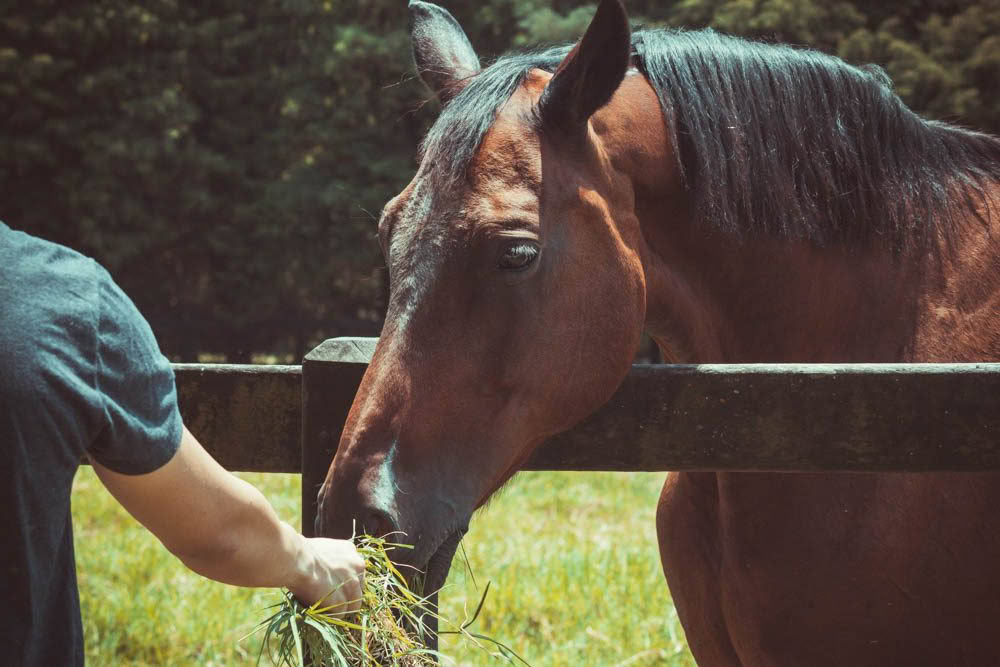Happy hacking
A large proportion of horses kept in New Zealand are used for light work including hacking, pony club, low-level competitions and riding for pleasure. While workloads may not be high, nutrient requirements still need to be met and careful consideration is required to provide a balanced diet for what is often a much-loved family pet. Farmlands Equine Nutritionist Luisa Wood offers some expert advice.

Compared to high-performance sport horses or racehorses, horses in light work have significantly different nutritional needs. Their diet should aim to provide enough calories to support their activity, while maintaining body condition at an optimum level. The Body Condition Score (BCS) system is a useful tool for this purpose and horses should ideally have a BCS of 3 on a 0–5 point scale. While requirements for protein, trace minerals and vitamins aren’t high, it’s important for general health and disease prevention that these are met daily.
Nutritional requirements are met through three primary components of the diet, which include forage, concentrates and supplements.
Forage: The Foundation of the Diet
Forage, such as hay, pasture or fibre products like chaff, should make up the bulk of the diet for all horses and is essential for maintaining digestive health. Horses should have access to long-stemmed forage for most of the day through pasture, or hay if pasture is in short supply. Ideally, they should consume 1.5–2 percent of their body weight in forage daily. For example, a 500 kg horse should eat between 7.5 to 10 kg of forage each day.
Concentrates: Supplementing Forage
While forage is the foundation, some horses may require additional concentrates to meet their energy needs and maintain optimum body condition. Concentrates can include grains, commercial feeds or a mix of both. Commercial feeds from credible companies can be a convenient way of feeding, as they often provide all daily calorie, protein and nutrient requirements. Therefore, selecting the right feed and providing it at the correct amount daily, can help to take a lot of the guesswork out of feeding. Suitable feeds for horses and ponies in light work are low-energy, lower-protein feeds such as McMillan Cool Feed.
Some horses can be intolerant to grains due to behaviour or health concerns such as metabolic conditions or laminitis. In this instance a low-starch feed such as McMillan Grain Free is ideal.
Many horses in light work can be classified as ‘good doers’ meaning they gain weight easily and are often at body condition scores higher than optimum. Good doers that require minimal calories other than what forage provides, are best fed with a concentrated balancer pellet to meet nutrient requirements, or a balanced vitamin and mineral supplement.
Supplements: Balancing the Diet
If a formulated feed or balancer pellet is provided at the correct daily levels, additional vitamin and mineral supplementation will not be required.
Salt should also be provided daily through a plain free-choice salt block or added to feeds. A balanced electrolyte is also recommended on days the horse works, to replace nutrients lost through sweat. Other supplements are only required to target specific areas of health such as hoof and coat quality, joint health and digestive issues, and it is important to only select supplements from credible companies that have research to support the ingredients they contain.
Making Light Work of Nutrition
Feeding pony club horses and horses in light work is about finding the right balance. By focusing on high-quality forage, supplementing with concentrates as needed, and ensuring your horse receives essential vitamins and minerals, you can maintain their health and performance. Regular monitoring and adjustments based on their condition and workload will help keep these horses in optimal shape, ready for their next ride or competition.

